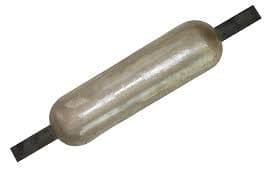Raw Material Selection: At the heart of any quality assurance plan is the careful selection of raw materials. Sacrificial anodes are typically made from highly active metals such as zinc, aluminum, or magnesium. A reputable manufacturer sources materials from trusted suppliers with proven track records of quality and reliability. Materials undergo rigorous testing to ensure they meet specified purity, composition, and performance criteria before being approved for production.
Manufacturing Processes: The manufacturing processes employed by a sacrificial anode manufacturer are critical to producing components of consistent quality and performance. These processes may include alloying, casting, extrusion, or machining, depending on the desired anode shape and configuration. Quality assurance measures are integrated throughout each stage of production to monitor process parameters, identify deviations, and maintain product consistency.
Quality Control Testing: Quality control testing is a cornerstone of any effective quality assurance plan. Sacrificial anode manufacturers conduct comprehensive testing to verify product quality and performance characteristics. This may include dimensional inspections, chemical analysis, mechanical testing, and electrochemical evaluations. By subjecting anodes to rigorous testing protocols, manufacturers ensure that each component meets or exceeds industry standards and customer specifications.
Compliance with Standards and Certifications: Adherence to industry standards and certifications is essential for demonstrating product quality and reliability. A reputable sacrificial anode manufacturer complies with relevant standards and specifications established by organizations such as ASTM International, NACE International, and ISO. Certification to recognized quality management systems, such as ISO 9001, further validates the manufacturer's commitment to quality assurance and continuous improvement.
Traceability and Documentation: Traceability is paramount in ensuring accountability and transparency throughout the manufacturing process. Sacrificial anode manufacturers maintain meticulous records of raw material sourcing, production processes, quality control testing, and shipping documentation. This traceability enables manufacturers to track each component's journey from inception to delivery, facilitating prompt identification and resolution of any issues that may arise.
Continuous Improvement: A commitment to continuous improvement is ingrained in the culture of a reputable sacrificial anode manufacturer. Regular audits, reviews, and feedback mechanisms enable manufacturers to identify opportunities for enhancing product quality, optimizing processes, and addressing customer needs. By fostering a culture of continuous improvement, manufacturers ensure that their quality assurance plan evolves to meet the evolving demands of the industry and customers.
Conclusion:
The quality assurance plan of a sacrificial anode manufacturer is a multifaceted framework designed to uphold the highest standards of quality, consistency, and reliability. Through meticulous raw material selection, robust manufacturing processes, comprehensive quality control testing, compliance with standards and certifications, traceability, and a commitment to continuous improvement, manufacturers ensure that their sacrificial anodes meet the stringent requirements of corrosion protection applications. By prioritizing quality assurance, manufacturers uphold their reputation as trusted partners in safeguarding the integrity of metal structures against the relentless forces of corrosion.
